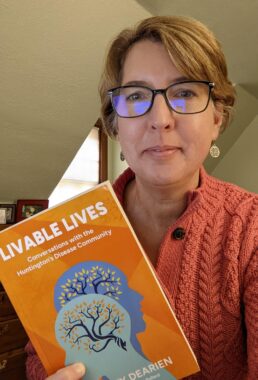‘Livable Lives’ gives a voice to the Huntington’s community, part 2
Chatting with author Christy Dearien about the impact of sharing our stories
Written by |

Second in a series. Read part one.
Last week, I introduced Christy Dearien, the author of “Livable Lives: Conversations with the Huntington’s Disease Community.” The book explores how Huntington’s disease (HD) affects relationships, identity, and life decisions. My wife and daughter, as well as Christy’s brother, are gene-positive for the disease.
We recently chatted about the book via email, and Christy reflected on how the stories shared could impact the HD community. Excerpts of our conversation follow.
CB: You spoke with so many individuals and families touched by HD. Were there moments or stories that surprised or deeply moved you — perhaps changing how you see the HD community, or even your own role in it?

Christy Dearien is the author of “Livable Lives: Conversations with the Huntington’s Disease Community,” available on Amazon. (Courtesy of Christy Dearien)
CD: I was very moved by the deep emotions people expressed in many of these conversations. Every now and then, someone would say something that left a big impression, like telling me they can count over 30 family members with the disease or describing how difficult it is to think about how HD impacts their children. I was moved whenever a young person talked about providing care for their parent, and I was inspired when people talked about how they approach their lives when they know they’ll develop HD one day. There is no shortage of touching and impactful stories in this community.
One thing I learned from these conversations is that having support and having a community that understands HD can make a positive difference in how people cope.
One storyteller grew up in a family that never hid HD, and her mom repeatedly told her she’ll always be there to support her, no matter what. One young man’s father actively educated people in their small town so his kids would feel like the people around them had a basic understanding of HD. Many storytellers talked about the importance of connecting with others at HD camps, support groups, and conventions. In some cases, these experiences provided a support network these storytellers had never had before.
Ultimately, I learned that there’s real power in community and connection.
How do you hope your book helps caregivers, families, and healthcare professionals better understand what it means to live with HD?
When I learned I was at risk, I knew nothing about HD. I found that I learned the most from other people’s stories. I needed to see how others experienced this disease so I could figure out what my family was facing and how I was going to cope. Each story I encountered taught me something new about HD, and I hope the stories in “Livable Lives” will do the same for others.
“Livable Lives” provides an inside peek into the many ways HD impacts our community. In addition to having a long list of potential symptoms, Huntington’s disease affects our identities, our relationships, and the decisions we make, as well as how we think about what the future holds. Our stories are complex, and no two stories are alike. When family members, caregivers, and healthcare professionals learn about and understand HD, we all benefit. Having support and understanding can help us communicate openly, feel less isolated in our experiences, and result in better care for our loved ones.
Altogether, the stories in “Livable Lives” provide a big-picture understanding of what it means to live with HD, whether we are at risk, gene-negative, presymptomatic, or experiencing symptoms.
What do you think the HD community should understand about having hope?
It’s important to know that hope doesn’t spring to life all by itself. It has to originate somewhere. When I interviewed the book’s storytellers, I was very interested in knowing if they had hope, and, if so, where they found it. I thought their answers would give me insight into what helps people get through the hardest times.
A lot of people said that they find hope in research. We have many reasons to be hopeful about research right now, especially with the recent good news from uniQure, but it is up to others to make research successful. Members of the HD community have little control over if or when disease-modifying treatments will be widely available.
Storytellers also talked about finding hope in things that they were involved in, like raising awareness, participating in clinical trials, or connecting with others. When people talked about finding hope in the things they were involved in and the things they were doing to make a difference, it seemed empowering and meaningful to them. There are many examples of this within the pages of “Livable Lives,” but there are also examples all throughout the HD community. There are many people in this community who work tirelessly to support and advocate for each other — something that gives others hope.
My takeaway is that, when this community comes together, works together, and supports each other, we can create our own hope.
Note: Huntington’s Disease News is strictly a news and information website about the disease. It does not provide medical advice, diagnosis, or treatment. This content is not intended to be a substitute for professional medical advice, diagnosis, or treatment. Always seek the advice of your physician or other qualified health provider with any questions you may have regarding a medical condition. Never disregard professional medical advice or delay in seeking it because of something you have read on this website. The opinions expressed in this column are not those of Huntington’s Disease News or its parent company, Bionews, and are intended to spark discussion about issues pertaining to Huntington’s disease.



GRACIELA MESSYNGIER
tengo doa iijos con huntigton, cero esperanzas tengo, no hay tiempo para seguir esperando, no se de que wsperanza me hablan!!!